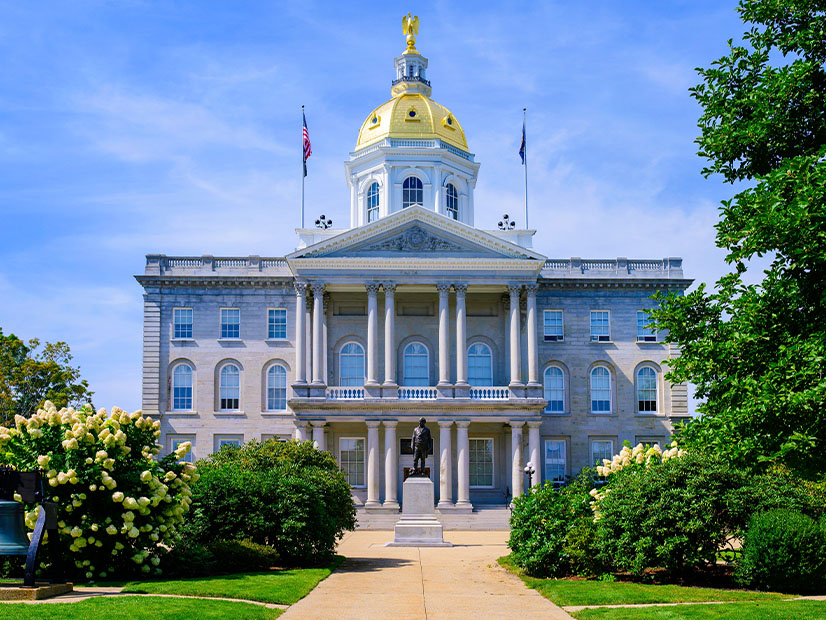New rules proposed by the New Hampshire Public Utilities Commission would “unduly exclude” companies and organizations from participating in its proceedings, according to a coalition of power generators, consumer advocates and environmental organizations.
The comments came in response to a pair of initial proposals that would overhaul how the commission undertakes proceedings. The proposals are intended to codify the delegation of responsibilities between the PUC and the state’s Department of Energy, which was established in 2021 (DRM 24-085, DRM 24-086). (See NH Poised to Merge Utility Regulator into New Dept. of Energy.)
The proposals drew widespread backlash for changes that appear to limit which organizations can participate in PUC proceedings. The concerns stem from how the new proposed rules would define an organization’s “standing” to participate in a proceeding. The groups wrote that the proposed definition — which limits standing to parties that face “direct injury” as the result of the proceeding — is “far too restrictive.”
“The proposed rules might bar many parties, like those in this joint letter, with clear, substantial interests; legitimate grounds for intervening; expertise on certain matters before the commission; and a long history of constructive participation in commission proceedings,” the groups wrote.
The changes could conflict with New Hampshire laws regarding intervention in utility proceedings, the coalition wrote. It proposed eliminating the definition of standing from the new rules, arguing that it is unnecessary.
“Because the proposed rules would drastically change the nature of commission proceedings, we urge the commission to engage in a more deliberative process before taking any action to finalize these rules,” the groups added.
The New England Power Generators Association (NEPGA) highlighted the “extraordinary coalition” that signed the joint comments, including the Conservation Law Foundation, the Consumer Energy Alliance and the Community Power Coalition of New Hampshire.
“This is pretty simple right vs. wrong in how these regulatory dockets should function,” NEPGA wrote in a statement. “We hope the New Hampshire PUC recognizes the error of this proposal and rethinks how dockets are dealt with for the benefit of all.”
The New Hampshire Office of the Consumer Advocate (OCA) raised similar concerns in comments submitted to the PUC in July, writing that standing to participate in a proceeding “should simply not be defined in the commission’s rules” and that the definition included “is vastly too narrow.”
The OCA also expressed concern that the proposed rules “seek to appropriate a significant degree of policymaking authority to the commission that rightfully belongs to the Department [of Energy].” The proposed changes would shift the PUC toward “a paradigm in which the tribunal and its presiding officer are not simply neutral decisionmakers but are also assuming a prosecutorial role,” it said. Increasing the role of the PUC in the discovery and development of evidence could undermine its statutory role as a neutral arbiter while deciding cases, it added.
The office also urged the commission to use the rulemaking as an opportunity to promote transparency in public utility proceedings, arguing that information submitted by utilities in PUC proceedings is frequently treated with a broad stamp of confidentiality.
“We respectfully suggest a reexamination of the assumptions underlying confidential treatment of commission records, a subject of particular interest to the OCA because our enabling statute requires us to maintain the confidentiality of all information so designated by the commission in adjudicative proceedings,” the office wrote.
Concerns about the rulemaking appear to be shared by the state’s utilities. At a public hearing on the proposal in July — which was not attended by the PUC commissioners, according to testimony by the OCA — Eversource Energy requested a “a more collaborative and participatory process.”
“The changes proposed by the commission are substantial and extensive,” said David Wiesner, Eversource senior counsel. “Some are long overdue and welcomed logistical updates to account for the creation of the Department of Energy, while others are significant revisions or entirely new procedures altogether that would change core regulatory processes that currently exist.”
A representative of Unitil echoed these comments and added that the rules limiting who can participate in proceedings appear to be “essentially unconstitutional.”




